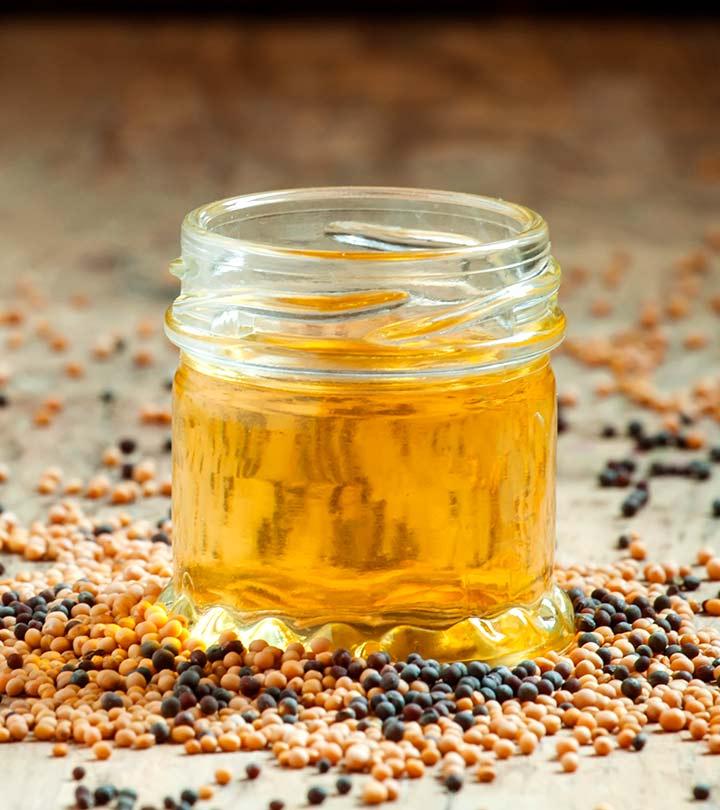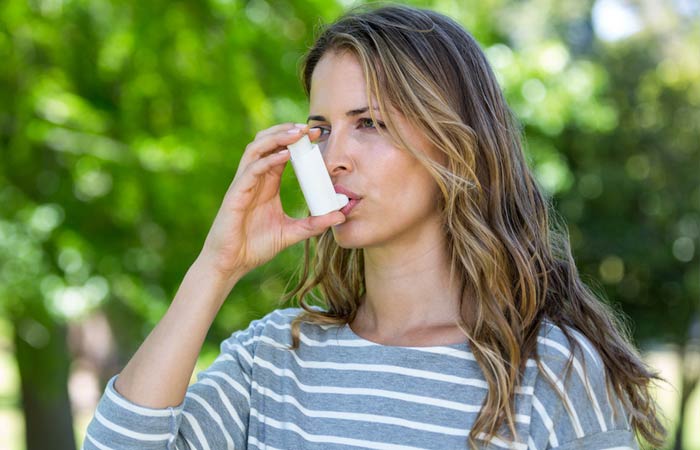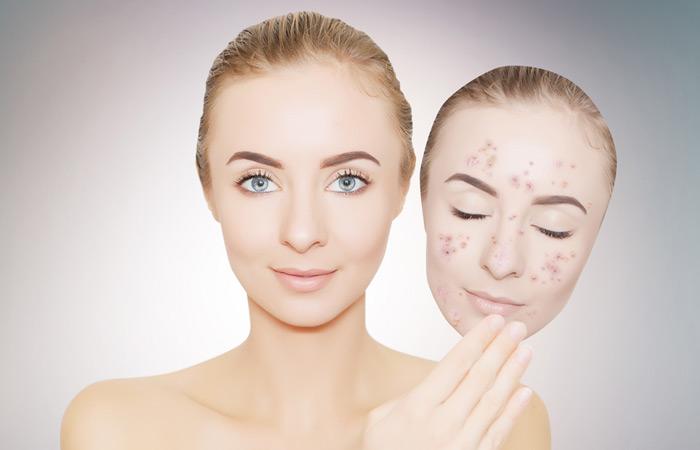“It’s
just an oil,” you would think. What’s so special about an oil made from
seeds? Well, mustard oil is not just like any other oil you use in your
cooking. It is a true superhero.
Don’t believe us? Read this article, and you will surely change your stance.
Scientific Name: Brassica juncea
Common Names: Sarson ka tel (Hindi), Sarsay tel (Bengali), Kadugu Ennai (Tamil), Avanune (Telugu), Rainu tel (Gujarati), Mohariche tel (Marathi), Kadugenna (Malyalam), and Sorisha tela (Oriya)
Color: Dark (reddish) yellow
Aroma: Strong
Taste: Pungent and sharp flavor
Smoke Point: 480oF/250oC
Extraction Process: Extracted from mustard seeds and purified through distillation
How Mustard Oil Is Made: There are two ways of making mustard oil: by pressing and grinding.
The first method is to press the mustard seeds to get a vegetable oil. The second method is to grind the seeds, mixing them with water, and then extracting the oil by distillation. This results in mustard oil that is lower in fat content.
And now, here’s a glimpse into the history of mustard oil.
Don’t believe us? Read this article, and you will surely change your stance.
Table Of Contents
- What Do I Need To Know About Mustard Oil
- Its History
- What Are The Nutrients In Mustard Oil
- What Are The Health Benefits Of Mustard Oil
- Does It Have Benefits For The Skin As Well
- Is Mustard Oil Good For My Hair
- Any Recipes With Mustard Oil
- How To Select And Store Mustard Oil
- Any Other Uses Of Mustard Oil
- Where Do I Buy Mustard Oil
- I Am Wondering If Mustard Oil Has Any Side Effects
- What Is The Final Word
What Do I Need To Know About Mustard Oil?
Mustard oil is extracted from the seeds of the mustard plant. It has culinary as well as therapeutic uses. Here are some quick facts about mustard oil:Scientific Name: Brassica juncea
Common Names: Sarson ka tel (Hindi), Sarsay tel (Bengali), Kadugu Ennai (Tamil), Avanune (Telugu), Rainu tel (Gujarati), Mohariche tel (Marathi), Kadugenna (Malyalam), and Sorisha tela (Oriya)
Color: Dark (reddish) yellow
Aroma: Strong
Taste: Pungent and sharp flavor
Smoke Point: 480oF/250oC
Extraction Process: Extracted from mustard seeds and purified through distillation
How Mustard Oil Is Made: There are two ways of making mustard oil: by pressing and grinding.
The first method is to press the mustard seeds to get a vegetable oil. The second method is to grind the seeds, mixing them with water, and then extracting the oil by distillation. This results in mustard oil that is lower in fat content.
And now, here’s a glimpse into the history of mustard oil.
Its History
- Mustard oil has been popularly used in countries like India, Rome, and Greece for thousands of years.
- Mustard was first grown in India around 3000 BC.
- Its first known uses were medicinal – Hippocrates used mustard seeds to prepare certain medicines.
- The Romans added mustard seeds to their wine and Pythagoras, the Greek scientist, used it as a natural treatment for scorpion stings.
- Apart from its medicinal uses, mustard oil has been used by North Indian women for cooking for decades.
What Are The Nutrients In Mustard Oil?
Mustard oil has an edge over other oils due to the optimum ratio of omega-3 and omega-6 fatty acids and low content of saturated fats. Its nutritional profile is given below.| AMOUNT PER 1 TSP (4 G) 1 TBSP (14 G) 100 GRAMS 1 CUP (218 G) 100 GRAMS | ||||||||
| Calories 884 | ||||||||
| % Daily Value* | ||||||||
| Total fat 100 g | 153% | |||||||
| Saturated fat 12 g | 60% | |||||||
| Polyunsaturated fat 21 g | ||||||||
| Monounsaturated fat 59 g | ||||||||
| Sodium 0 mg | 0% | |||||||
| Total Carbohydrate 0 g | 0% | |||||||
| Dietary fiber 0 g | 0% | |||||||
| Protein 0 g | 0% | |||||||
| Vitamin A | 0% | |||||||
| Calcium | 0% | |||||||
| Vitamin B-6 | 0% | |||||||
| Magnesium | 0% | |||||||
| Vitamin C | 0% | |||||||
| Iron | 0% | |||||||
| Vitamin B-12 | 0% | |||||||
- Key Nutrients: It contains about 60% monounsaturated fats (MUFA), 21% polyunsaturated fats (PUFA), and 12% saturated fats. These fatty acids are considered ‘good fats’ as they do not get deposited on the arterial walls. Its pungent and sharp flavor can be attributed to a compound called allyl isothiocyanate. It also contains glucosinolates that have antimicrobial properties. Mustard oil does not contain carbohydrates, fiber, protein, vitamins, and minerals. Being a vegetable source, mustard oil contains alpha-linolenic acid or ALA, an essential omega-3 fatty acid. One teaspoon of mustard oil contains around 0.8 grams of omega-3 fatty acid.
- Calories And Fat: One tablespoon of mustard oil contains about 124 calories. It contains about 14 grams fat, out of which 8.3 grams is monounsaturated fat, 2.9 grams is polyunsaturated fat, and 1.6 grams is unsaturated fat. It has a lower content of monounsaturated fats as compared to olive, flaxseed, grape seed, and peanut oils.
What Are The Health Benefits Of Mustard Oil?
The health benefits of mustard oil are multiple. It is known to cure diseases and problems related to the heart, skin, joints, muscles, and so much more. Following are some of the well-known benefits of this wonder oil.1. Reduces The Risk Of Cancer
Research suggests that mustard oil has strong cancer-fighting properties. It contains ample amounts of linolenic acid, which when converted to omega-3 fatty acid, helps prevent stomach and colon cancers.A study by South Dakota University proves the same. They tested the efficacy of mustard, corn, and fish oils on rats affected by colon cancer. Mustard oil was found to be more effective in preventing colon cancer than fish oil (1).
2. Has Cardiovascular Benefits
Did you ever think that consuming an oil would actually benefit your heart? Me neither!Mustard oil contains rich amounts of monounsaturated and polyunsaturated fatty acids (MUFA and PUFA) as well as omega-3 and omega-6 fatty acids. These good fats lower your risk of developing ischemic heart disease by 50% (2).
Enriched mustard oil is also known to show hypocholesterolemic (cholesterol-lowering) and hypolipidemic (lipid-lowering) effects (3). It reduces bad cholesterol (LDL) levels and increases good cholesterol (HDL) levels in the body, thereby reducing the risk of cardiovascular diseases.
3. Is A Natural Stimulant
Mustard oil is a very powerful natural stimulant. It improves digestion and appetite by stimulating digestive juices and bile in the liver and spleen.When massaged into the skin, it also stimulates our circulatory system and sweat glands. This ensures improved blood circulation throughout the body and enlarged skin pores through sweating.
This diaphoretic ability of mustard oil results in lowered body temperature and removal of toxins from the body.
4. Stimulates Sensation In The Muscles
Feeling numbness in your muscles?Just massage some mustard oil on the affected area, and you will slowly start gaining some sensation in your muscles.
5. Relieves Cold And Cough
Owing to its pungent nature, mustard oil has been used to cure cold and cough since decades.It contains a heating property that clears up the congestion in the respiratory tract. It works best when combined with garlic and massaged on the chest and back.
Another method of using mustard oil for clearing cold and cough is using steam treatment. Add caraway seeds and a few spoonfuls of mustard oil to a pot of boiling water and inhale the steam. This clears the phlegm build-up in the respiratory tract.
6. Eases Joint Pain And Arthritis
Regularly massaging mustard oil on the skin works amazingly well in curing joint aches and arthritis by increasing blood flow and circulation throughout the body.Mustard oil also contains large amounts of omega-3 fatty acids, which act as an anti-inflammatory to ease joint stiffness and pain associated with arthritis (4).
7. Helps Heal Chapped Lips
Do you have trouble with chapped lips?Each night, just before you are about to sleep, pour two or three drops of mustard oil in your navel.
Yes, you read that right! Pour two or three drops of mustard oil in your belly button. As long as you do this every night, you should never have to worry about having chapped lips ever again.
8. Improves Functioning Of The Organs
A massage done with mustard oil refreshes the body and improves the functioning of your organs by increasing blood circulation to all parts of the body.Mustard oil massage for newborns is quite a popular practice in many countries. Studies showed that the common reasons to use mustard oil for massaging were to promote strength, maintain health, and provide warmth to the body (5).
9. Has Antibacterial, Antifungal, And Anti-inflammatory Properties
Mustard oil is known to contain antibacterial, antifungal, and anti-inflammatory properties.Its anti-inflammatory properties are attributed to the presence of selenium, which reduces pain and swelling, thus easing joint pain. This anti-inflammatory property of mustard oil also finds its use in the formulation of diclofenac, an anti-inflammatory medication (6).
Recent studies have shown that microemulsions containing mustard oil work as antibacterial agents against E. coli (7). The glucosinolate present in mustard oil prevents the growth of unwanted bacteria and other microbes.
Mustard oil also contains powerful antifungal properties that can treat skin rashes and infections caused by fungi. A study was conducted on rye bread spoilage (by fungi) by exposing it to different oils. Mustard oil proved to be the most effective, owing to the presence of a compound called allyl isothiocyanate (8).
10. Beneficial For Asthma
Asthma is a disease that has no permanent cure. But its symptoms and effects can be managed and greatly reduced by using mustard oil. This is known to be one the safest and most effective cures to treat the effects of asthma.Massage brown mustard oil on your chest to increase airflow to the lungs during an asthma attack. Or you can make a mixture of 1 tablespoon of mustard oil with 1 teaspoon of camphor and rub it on your chest.
You can also prevent asthma attacks by swallowing a mixture of one tablespoon each of mustard oil and honey, three times a day.
11. Is An Excellent Insect Repellent
Worried about mosquito or insect bites when you go outdoors? Apply some mustard oil on your skin, and insects will stay away from you.This property of mustard oil was evaluated in a study conducted in Assam, India. The repellent properties of mustard and coconut oils were evaluated against Aedes (S.) albopictus mosquitoes. Mustard oil was very effective in providing protection for a longer time as compared to coconut oil (9).
12. Whitens Teeth And Treats Dental Problems
Why spend so much money on teeth whitening strips or chemical treatments to whiten your teeth when you can use mustard oil?Make a paste of ½ teaspoon of mustard oil, 1 teaspoon of turmeric powder, and ½ teaspoon of salt. Rub this mixture on your teeth and gums twice a day to promote healthy teeth and provide relief from gingivitis and periodontitis (10).
13. Boosts Brain Function
The high concentration of fatty acids present in mustard oil is known to boost brain function and help treat depression. They are also said to boost memory and improve cognitive functions in the brain.This property highly benefits children, especially during their exams.
14. Promotes Overall Health
Mustard oil can be used as a healthy tonic to promote overall health and wellness of the body. It provides benefits to the entire body, whether consumed or used externally.And now, let’s find out how to use this oil for prettier skin.
Does It Have Benefits For The Skin As Well?
Of course, it does! The regular use of mustard oil can give you glowing and healthy skin. Read on to know about its benefits in detail.15. Removes Tan And Dark Spots
Massaging mustard oil on your face regularly can significantly reduce tan, dark spots, and skin pigmentation.Make a paste of mustard oil with chickpea flour, 1 teaspoon of yogurt, and a few drops of lemon juice. Apply this on the face and neck. Leave it on for 10 to 15 minutes before washing it off with cold water. Do this three times a week for a few months, and you will notice excellent results.
16. Lightens The Skin Tone
Mustard oil is rich in vitamins A, B complex, and E – all of which promote anti-aging and healthy skin.For young-looking skin, mix equal parts of mustard and coconut oils. Massage this mixture into your skin every night for 15 minutes and then wash off with a mild face wash.
If you use it regularly, you will start to notice your skin tone getting lighter. It also reduces the signs of aging by delaying the onset of wrinkles.
17. Natural Sunscreen
You don’t ever have to worry about going out in the sun or buy expensive sunscreens as long as you have mustard oil at home.Massage a small quantity of this wonder oil into your skin before you step outdoors. The high amount of vitamin E in this oil protects your skin from the harmful UV rays and environmental toxins.
Remember not to use large quantities of this oil on your skin because excess oil attracts dust and pollution.
18. Treats Rashes And Infections
As mentioned earlier, mustard oil has powerful anti-inflammatory, antibacterial, and antifungal properties, which help it to ward off infections and treat skin rashes and allergies. It also prevents dryness and itching.19. Has Anti-Aging Effects
Mustard oil is brilliant in promoting anti-aging. The excess amount of vitamin E present in it accounts for a significant reduction in wrinkles and other signs of skin aging on regular use.Is Mustard Oil Good For Hair?
Yes, it is. Mustard oil ensures hair growth, prevents hair loss, reduces graying, and much more. Moreover, a mixture of mustard oil and curd can work wonders for the hair. Read on to know more.20. Stimulates Hair Growth
Regular hair massages keep the scalp nourished. Mustard oil stimulates hair growth by increasing blood circulation in the scalp. It contains protein, a major component of hair, and omega-3 fatty acids – both of which nourish your hair and encourage hair growth.The antibacterial and antifungal properties of this oil prevent hair loss and ensure healthy hair growth.
Using this oil for hair growth is very easy. Just massage a little oil into your hair and scalp. Cover your hair with a shower cap for about 3 hours and shampoo and condition your hair as usual. After a few uses, you will see visible results.
21. Prevents Premature Graying
Mustard oil is packed with essential vitamins and minerals that help prevent premature graying of hair on regular use.You can use this before going to bed. Apply mustard oil to your hair and leave it on for 30 minutes before washing it off.
22. Gets Rid Of Dandruff And Itchy Scalp
The antibacterial and antifungal properties of mustard oil ensure a healthy scalp, free from dandruff and itchiness.Mix equal amounts of mustard and coconut oil and massage into the hair. Cover your hair with a towel and leave it on for two hours. Wash off with a mild shampoo. Do this a few times a week and watch your dandruff disappear slowly.
Are you wondering how you can use this oil in your cooking? Here are some recipes to help you out.
What Are Some Recipes With Mustard Oil?
1. Mango Pickle
You Will Need
- 500 grams raw mango pieces
- 100 grams mustard oil
- 1 teaspoon asafoetida
- 50 grams mustard seeds
- ½ teaspoon dry ginger powder
- ½ teaspoon turmeric powder
- 100 grams garlic cloves
- 50 grams red chilli powder
- Salt as per taste
Method
- Marinate the mango pieces in salt and turmeric. Leave them overnight.
- Remove the water from them and dry them in the sun.
- Fry the garlic cloves.
- Heat the mustard oil till it smokes and leave it aside to cool.
- When the mango pieces are completely dried, mix them with garlic cloves, oil, and all spices and store the pickle in a jar.
2. Tandoori Paneer Tikka
You Will Need
- 250 grams paneer (cottage cheese)
- 1 bell pepper (green, red or yellow – or a mixture of all three)
- 1 medium onion
For The Marination
- 200 grams thick yogurt
- 1 tablespoon ginger-garlic paste
- 1 teaspoon carom seeds
- 1-2 teaspoons red chilli powder
- ½ teaspoon turmeric powder
- 1 teaspoon cumin seed powder
- 1 teaspoon coriander seed powder
- ½ teaspoon garam masala powder
- 1 teaspoon dry mango powder
- 1 teaspoon chaat masala
- ½ teaspoon black pepper powder (optional)
- ½ tablespoon lemon juice
- 1 tablespoon mustard oil
- ½ teaspoon black salt (optional)
- Regular salt as required
Method
To Prepare The Tikka
Chop the paneer and the vegetables in square pieces and keep aside.To Prepare The Marination
- In a bowl, whisk the curd till there are no lumps.
- Add the ginger-garlic paste, all the spices, carom seeds, and salt to the curd and mix well.
- Add the vegetables and paneer to the marinade and coat them well.
- Leave this marination for two or more hours in the refrigerator.
- Remove from the refrigerator and allow the vegetables to come to room temperature.
- Arrange the paneer and vegetable cubes on skewers.
Making The Tikka
- Preheat the oven for 15 minutes at 240o
- On a rack, arrange the skewers and brush the mustard oil on the marinated paneer and vegetables.
- Bake the tikkas for 15 to 20 minutes or till they turn golden and then turn the skewers.
- Bake again for another 10 to 15 minutes or till they are baked completely.
- Arrange the tikkas on a plate, squeeze some lemon juice, and sprinkle some chaat masala on them.
- Serve hot.
How To Select And Store Mustard Oil
Selection
There are plenty of mustard oils available in the market, so selecting the right one can seem challenging. Let me make that task easier for you by telling you a little bit about the three main types:- Kachi Ghani
- Agmark
- Grade 1
Storage
Mustard oil should only be bought in a quantity that will be used for up to 6 months after opening its seal. Store the oil in an airtight bottle, preferably in a refrigerator. This will prevent your mustard oil from turning rancid.Any Other Uses Of Mustard Oil?
There are plenty of uses of this oil – in cooking and beauty. Some of them are mentioned below.Cooking Uses
- Mustard oil is used in many Indian states as the main component in vegetarian and non-vegetarian dishes.
- It can be used as a salad dressing along with lemon and honey.
- Several pickles are made using mustard oil.
Other Uses
- Apply the oil on the skin for 10 minutes to remove tan, reduce the signs of aging, and treat itchiness and redness of skin.
- A full body massage with mustard oil helps to deeply nourish the skin as well as relax the body.
- Mustard oil boiled with henna leaves is said to increase hair growth and strengthen the hair follicles.
- Men can use mustard oil to grow their beard faster. All they need to do is fill a blue glass bottle with mustard oil and place it in the sun, preferably during early morning, for 40 days. After that, start using the oil on the beard and mustache to regrow or increase the hair.
Where Do I Buy Mustard Oil?
Mustard oil is easily available in the market and is sold under several brand names. Some of the best brands are Dhara, Fortune, Nature Fresh and Pure & Sure.So far, you have seen the benefits and uses of mustard oil. But, does it have any side effects? Let’s find out.
I Am Wondering If Mustard Oil Has Any Side Effects
Yes, just like any other ingredient, mustard oil too has its share of side effects. They are:- It can cause anemia due to the presence of large amounts of erucic acid in the oil.
- Consuming mustard oil in large quantities can increase your risk of lung cancer.
- It can cause vaginal bleeding, which can eventually cause miscarriage.
- Consuming large quantities of this oil can be harmful for the heart.
What Is The Final Word?
Mustard oil can be easily labeled as one of the healthiest oils in the market.Whether you use it for cooking, in medicine, or as an ingredient in your beauty routine, you will not be disappointed.
Comment below to let us know what you think of this post.
Source Click here






Comments
Post a Comment